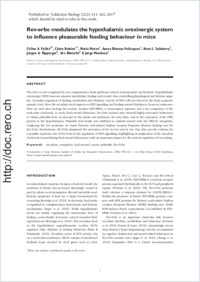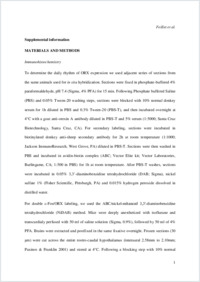Rev‐erbα modulates the hypothalamic orexinergic system to influence pleasurable feeding behaviour in mice
- Feillet, Céline A. Department of Biology, Unit of Biochemistry, University of Fribourg, Switzerland
- Bainier, Claire Institute of Cellular and Integrative Neurosciences, Strasbourg, France
- Mateo, Maria Institute of Cellular and Integrative Neurosciences, Strasbourg, France
- Blancas-Velázquez, Aurea Institute of Cellular and Integrative Neurosciences, Strasbourg, France
- Salaberry, Nora L. Institute of Cellular and Integrative Neurosciences, Strasbourg, France
- Ripperger, Jürgen A. Department of Biology, Unit of Biochemistry, University of Fribourg, Switzerland
- Albrecht, Urs Department of Biology, Unit of Biochemistry, University of Fribourg, Switzerland
- Mendoza, Jorge Institute of Cellular and Integrative Neurosciences, Strasbourg, France
-
01.03.2017
Published in:
- Addiction Biology. - 2017, vol. 22, no. 2, p. 411–422
English
The drive to eat is regulated by two compensatory brain pathways termed as homeostatic and hedonic. Hypothalamic orexinergic (ORX) neurons regulate metabolism, feeding and reward, thus controlling physiological and hedonic appetite. Circadian regulation of feeding, metabolism and rhythmic activity of ORX cells are driven by the brain suprachiasmatic clock. How the circadian clock impacts on ORX signalling and feeding-reward rhythms is, however, unknown. Here we used mice lacking the nuclear receptor REV-ERBα, a transcription repressor and a key component of the molecular clockwork, to study food-reward behaviour. Rev-Erbα mutant mice showed highly motivated behaviours to obtain palatable food, an increase in the intake and preference for tasty diets, and in the expression of the ORX protein in the hypothalamus. Palatable food intake was inhibited in animals treated with the ORX1R antagonist. Analyzing the Orx promoter, we found Retinoic acid-related Orphan receptor Response Element binding sites for Rev-Erbα. Furthermore, Rev- Erbα dampened the activation of Orx in vitro and in vivo. Our data provide evidence for a possible repressive role of Rev-Erbα in the regulation of ORX signalling, highlighting an implication of the circadian clockwork in modulating food-reward behaviours with an important impact for the central regulation of overeating.
- Faculty
- Faculté des sciences et de médecine
- Department
- Département de Biologie
- Language
-
- English
- Classification
- Biological sciences
- License
- License undefined
- Identifiers
-
- RERO DOC 288516
- DOI 10.1111/adb.12339
- Persistent URL
- https://folia.unifr.ch/unifr/documents/305327
Other files
Statistics
Document views: 59
File downloads:
- alb_rem.pdf: 163
- alb_rem_sm.pdf: 80

